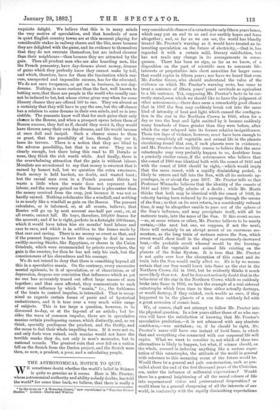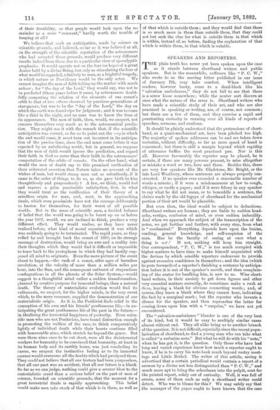THE ASTRONOMICAL NOTICE TO QUIT.
WE sometimes doubt whether the world's belief in Science is quite so genuine as it seems. Here is Mr. Proctor, whose astronomical authority and ability nobody doubts, has told the world* for some time back, we believe, that there is really a
• In the essay on "A Menacing Comet," now republished in "Familiar Science Studies." London : Chatto and Windus.
very considerable chance of a catastrophe only fifteen years hence, which may put an end to us and our earthly hopes and fears altogether ; and, so far as we can see, the world has blandly treated Mr. Proctor's warning as it would have treated an in. teresting speculation on the future of electricity,—that is, has regarded it with a certain mild, literary satisfaction, but has not made any change in its arrangements in conse- quence. There has been no sign, so far as we know, of a disposition on the part of scientific men to commute life- interests or perpetuities into short annuities for larger sums that would expire in fifteen years ; nor have we heard that even Mr. Justice Grove, who should understand the value of the evidence on which Mr. Proctor's warning rests, has come to treat a sentence of fifteen years' penal servitude as equivalent to a life sentence. Yet, supposing Mr. Proctor's facts to be cor- rectly stated,—on which we should like to have the judgment of other astronomers,—there does seem a remarkably good chance that in 1897 the Sun may suddenly break out into the same kind of intensity of heat and light which caused the conflagra- tion in the star in the Northern Crown in 1866, when for a day or two the heat and light emitted by it became suddenly many hundreds of times greater than they were before, after which the star relapsed into its former relative insignificance. Those few days of violence, however, must have been enough to destroy completely all vegetable and animal life in the planets circulating round that sun, if such planets were in existence ; and Mr. Proctor shows no little reason to believe that the same catastrophe may very probably happen to us, doubtless from. a precisely similar cause, if the astronomers who believe that the comet of 1880 was identical both with the comet of 1843 and with the comet of 1668 should be right,—which would imply that the same comet, with a rapidly diminishing period, is likely to return and fall into the Sun, with all its meteoric ap- pendages, in or about the year 1897. Mr. Proctor tells us that Professor Winnecke believes that the identity of the comets of 1843 and 1880 hardly admits of a doubt ; while Mr. Marth thinks that both may be identical with the comet of 1668, its velocity having been reduced by its passage through the corona of the Sun ; so that on its next return, in a considerably reduced time, it may be altogether unable to pass out of the sphere of the Sun's influence, and may precipitate itself, with all its meteoric train, into the mass of the Sun. If this event occurs —as, at some return or other, Mr. Proctor believes to be nearly certain,—(the next but one, we suppose, if not the next), there will certainly be an abrupt arrest of an enormous mo- mentum, as the long train of meteors enters the Sun, which arrest would show itself in the shape of enormously-increased heat,—the probable result whereof would be the burning- up of all the vegetable and animal life existing on the planets of the Solar System. It is true that Mr. Proctor is not quite sure how the absorption of' this comet and its train into the Sun would really affect us. He is by no means certain that our Sun would burst into flame as the star in the Northern Crown did in 1866, but he evidently thinks it much more likely than not. And he does not seriously doubt that in the behaviour of the star in the Northern Crown which so suddenly broke into flame in 1866, we have the example of a real sidereal catastrophe which from time to time either actually destroys, or would destroy, if they existed, such worlds as ours, if they happened to be the planets of a sun thus suddenly fed with a great accession of cosmic heat.
We, of course, shall not attempt to follow Mr. Proctor into the physical question. In a few years either those of us who sur- vive will have the satisfaction of knowing that Mr. Proctor's speculative prediction,—it is not advanced with any absolute confidence,—was mistaken ; or, if he should be right, Mr. Proctor's name will have one instant of lurid fame, in which that and everything else connected with our corporeal life will expire. What we want to consider is, not which of these two alternatives is likely to happen, but what, if science should, on the whole, succeed in inducing anything like a serious expec- tation of this catastrophe, the attitude of the world in general with reference to this menacing event of the future would be.
Would there be a general and pale consternation, such as pre- vailed about the end of the first thousand years of the Christian era, under the influence of millennial expectations ? Would
there be a general heightening of all the moral colours of life into supernatural virtue and preternatural desperation ? or would there be a general cheapening of all the interests of our world, in conformity with the rapidly diminishing expectations
of their durability, so that people would look upon the re- mainder as a mere "remnant," hardly worth the trouble of keeping at all P
We believe that such an anticipation, made by science on scientific grounds, and believed, so far as it was believed at all, on the strength of the scientific reputation of the astronomers who had accepted those grounds, would produce very different results indeed from those due to a particular view of apocalyptic prophecies. It would operate not on the fear (or hope) of a great Assize held by a divine Being, but only as stimulating the fear of what would be regarded, relatively to man, as a frightful tragedy, in which nature or Providence would be the only actor. We cannot imagine the men of faith taking-up the matter with much ardour ; for "the day of the Lord," they would say, was not to be predicted fifteen years before it came, by astronomers doubt- fully computing the relation of the elements of one comet's orbit to that of two others observed, by previous generations of star-gazers, but was to be the "day of the Lord," the day on which the earth was found ripe for judgment ; and it was to come like a thief in the night, and no man was to know the time of its appearance. The men of faith, then, would, we suspect, not concern themselves very much as to the astronomical predic- tion. They might use it with the remark that, if the scientific anticipation was correct, so far as to point out the way in which the end would come, it must turn out incorrect in its anticipa- tion of the precise time, since the end must come before it was expected by an unbelieving world; but in general, we suppose that the men of faith would ignore the prediction, and regard their faith in God as surer than their faith in the astronomers' computation of the orbits of comets. On the other hand, what would the men of doubt say to this promised verification of their reiterated assertion that Nature takes no account of the wishes of man, but would stamp man out as relentlessly, if it came in the order of things to do so, as she gave birth to him thoughtlessly and purposelessly ? A few, we think, would feel and express a grim pessimistic satisfaction, first, in what they would treat as the verification of their theory of a mindless origin for man, and, next, in the approaching finale, which even pessimists have not the courage deliberately to hasten for themselves, for their worst of all possible worlds. But in the mass of scientific men, a decided balance of belief that the world was going to be burnt up on or before the year 1897, would, we are inclined to think, produce a very different effect. They would realise, as they have never realised before, what kind of moral experiment it was which was suddenly going to be terminated. The rapid years, as they rolled by and brought back the comet of 1880, on its strange message of destruction, would bring an awe and a reality into their thoughts which they would find it difficult or impossible to trace back to the protoplasm in which they had hastily sup- posed all mind to originate. Even the mere picture of the event about to happen,—the rush of a comet, after ages of harmless revolution, at the velocity of more than a million miles per hour, into the Sun, and the consequent outburst of stupendous conflagrations in all the planets of the Solar System,—would suggest to a thoughtful mind rather a sudden transformation, planned by creative purpose for immortal beings, than a natural death. The theory of materialistic evolution would find its euthanasia, we suspect, for the higher minds, in the very event which, to the mere reasoner, supplied the demonstration of our materialistic origin. As it is, the Positivist finds relief in the conception of his own and his friends' posthumous life,—in an- ticipating the great posthumous life of the past in the future,— in idealising the terrestrial happiness of posterity. Even scien- tific men who are not Positivists, have found distraction enough in promoting the welfare of the race, to think comparatively lightly of individual death while their hearts continue filled with honourable aims, which stretch far beyond the grave. But were these aims once to be cut short, were all the disinterested workers for humanity to be convinced that humanity, at least in its human body and its earthly home, was just concluding its career, we suspect the instinctive feeling as to its immortal essence would overcome all the doubts which had paralysed them. They could not believe that all our history had been purposeless, that all our past was an accident, that all our future is a blank. So far as we can judge, nothing could give a severer blow to the materialistic creed than a serious belief on the part of men of science, founded on scientific grounds, that the moment for a great terrestrial finale is rapidly approaching. This belief would make men take stock of that which is in them, as well as
of that which is outside them ; and they would find that there is so much more in them than outside them, that they could not but seek the clue for what is outside them in that which is within, instead of, as before, finding the explanation of that which is within them, in that which is outside.







































 Previous page
Previous page